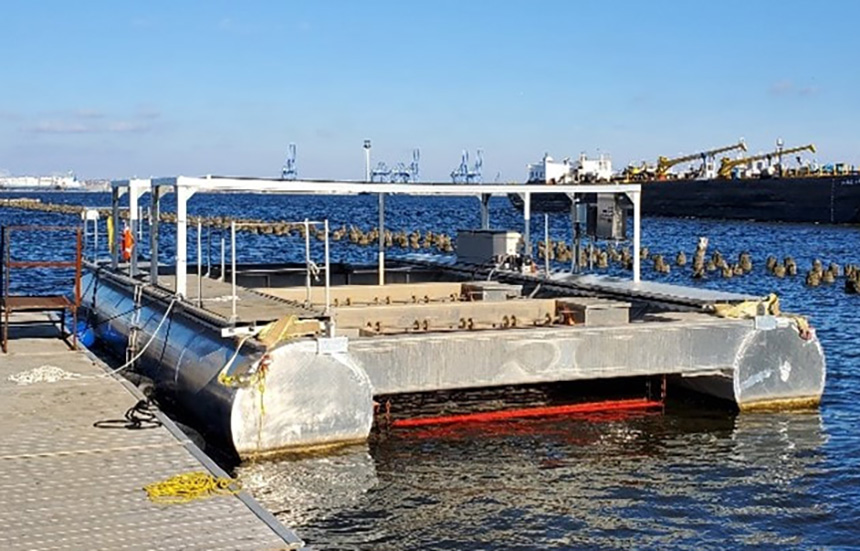SeafoodSource is closely following the sustainable seafood movement by compiling a regular round-up of sector updates about sustainability initiatives and certifications.
- U.S. public television channel PBS announced the premiere of its three-part documentary series, Hope in the Water, to be 19 June 2024 from 9 to 10 p.m. Eastern time. The first episode of Hope in the Water is titled "The Fish in the Sea."
The three-part program will focus on blue food technology that aids in food security efforts and improves sustainability in vulnerable seas around the world, highlighting the work of Shailene Woodley, Martha Stewart, Jose Andres, and Baratunde Thurston. Each activist is tied to a story in which they seek smart climate change solutions, and each will explore specific ocean environments jeopardized by climate change; illegal, unreported, and unregulated (IUU) fishing and exploitation; and habitat destruction.
The show was produced by David E. Kelley – who has been involved in the creation of several popular television shows, including "Doogie Howser, M.D." and "Big Little Lies" – and four-time James Beard Award-winner Andrew Zimmern. It is part of a multiyear impact campaign from nonprofit Fed by Blue aiming to produce content that inspires visionary work in ocean sustainability.
- Cambridge, Maryland U.S.A.-based aquaculture technology producer Solar Oysters has partnered with vertically integrated oyster aquaculture company Blue Oyster Environmental to create the Solar Oyster Production System (SOPS).
The Solar Oyster Production System (SOPS) is estimated to produce up to 200,000 oysters in a 0.02-acre space, the companies said in a joint release. The prototype contains rotating solar panels with 575 oyster cages on five ladders to a depth of 16 feet.
“This increases the oysters’ access to varying food availability, dissolved oxygen, and salinity and exposes them to sunlight, which can inhibit biofouling. The SOPS technology includes a spray wash system powered by solar energy,” the companies said in a release.
The project will enhance environmental sustainability and efficiency to create a large quantity of oysters.
“We look forward to working with Blue Oyster Environmental as our partner in bringing this potentially game-changing technology to growers and those interested in oyster restoration,” Solar Oysters Business Director Steve Pattison said.
- Seattle, Washington U.S.A.-based seafood chain traceability company Trace Register announced it has achieved interoperability at scale between two traceability systems based on Global Dialogue on Seafood Traceability (GDST) standards, in partnership with Bloomfield Hills, Michigan U.S.A.-based Wholechain, a traceability across supply chain company.
The companies said the collaboration will help facilitate a two-way exchange of information, and will also help industry meet the requirements of the Seafood Import Monitoring Program (SIMP) and Food Safety Modernization Act (FSMA) Food Traceability Final Rule, according to Food Safety Magazine.
“Interoperability greatly reduces or even eliminates portal fatigue. When systems can seamlessly ‘talk’ to one another, then suppliers, producers, supermarkets, and distributors can each use a system that fits them best while having confidence that they can send and receive data regardless of what system their partners are using,” Trace Register President Heath England said.
- The Global Environment Facility (GEF), a multilateral environmental fund, has approved 48 FAO-led projects focusing on sustainable agrifood systems and food insecurity, worth USD 2.9 billion (EUR 2.7 billion) – comprised of USD 294 million (EUR 274 million) in project financing and USD 2.6 billion (EUR 2.4 billion) in co-financing.
The initiatives will benefit more than 4.2 million people in five regions across the globe, restore more than 474,000 hectares of land, improve more than two million hectares of land and sea areas, mitigate 133 million metric tons of greenhouse gas emissions, and remove 202 metric tons of hazardous agrochemicals, according to the GEF.
“This is the largest work program of FAO projects approved by the GEF Council. Working closely on the ground with partners and countries, these projects have the potential to improve millions of lives through agrifood systems transformation while helping achieve the [United Nations] Sustainable Development Goals. Together with the GEF, we strive towards ensuring global food security coupled with sustainable, inclusive, and resilient agriculture, benefitting people and the planet,” FAO Deputy Director General Maria Helena Semedo said in a release.
The countries that partnered with the FAO to access GEF financing for the program include Angola, Argentina, Barbados, Benin, Bhutan, Brazil, Cambodia, Chile, China, Dominica, Dominican Republic, Ecuador, Eswatini, Grenada, Guyana, India, Indonesia, Kazakhstan, Kyrgyzstan, Lao PDR, Maldives, Mexico, Mongolia, Namibia, Nepal, Niger, Nigeria, Pakistan, Peru, Philippines, Solomon Islands, South Africa, South Sudan, Sri Lanka, St. Kitts and Nevis, St. Vincent and Grenadines, Tajikistan, Tanzania, Togo, Trinidad and Tobago, Tunisia, Türkiye, Turkmenistan, Uzbekistan, Venezuela, and Vietnam.
- The Center for Biological Diversity, Círculo de Políticas Ambientales, SOS Galapagos, Turtle Island Restoration Network, and World Heritage Watch submitted a petition on 12 February requesting that the Galapagos Island World Heritage site be listed as “in danger” under the World Heritage Conservation.
The Galapagos Islands are vulnerable because of its biodiversity, illegal, unreported, and unregulated fishing, and fishing vessels straining the area, according to the Center for Biological Diversity.
“The World Heritage Committee has long been aware of these growing threats to the Galapagos Islands, and it’s time for action,” Center for Biological Diversity Senior Scientist Alejandro Olivera said. “Ecuador is failing this irreplaceable, biodiversity-rich treasure by not doing enough to restrict tourism and fight illegal fishing. The Father of Evolution would be deeply disappointed.”
In 2020, a fleet of Chinese fishing vessels anchored outside of the Galapagos marine park, many of which allegedly turned off monitoring devices for periods to avoid detection.
Photo courtesy of Solar Oysters







